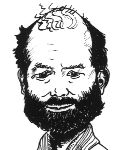Writing a dissertation
Writing a dissertation for either a final-year project or a PhD is a large task. Here are a few thoughts to help along the way.
Preparatory reading
- How to write and publish a scientific paper
- Robert Day
Cambridge University Press, 1995. - Improving your technical writing skills
- Norman Fenton
Queen Mary (University of London), 2003. - This includes further pointers to good advice.
- New Oxford style manual
- Oxford University Press, 2012.
- You need a copy of this next to you while you are writing.
- How to run a paper mill
- John Woodwark
Information Geometers, 1992. - This is now only available on-line.
Language
Your dissertation should be written in English. If this is not your native language, it is important that you ask someone literate to proof read your dissertation. Your supervisor only has a limited amount of time, so it would be sensible to ask two or three literate friends to read your dissertation before giving it to your supervisor. That way, he or she will be able to concentrate on the technical content without being distracted by the style.
Incidentally, it is a good idea to make sure that one of your readers is not a specialist in your area of research. That way they can check that you have explained the technical concepts in an accessible way.
Grammar
Chapter 27 of Day's book gives some useful advice on the use (and misuse) of English.
-
Tense —
You should normally use the present tense when referring to previously published work, and you should use the past tense when referring to your present results.
The principal exception to this rule is when describing experiments undertaken by others in the past tense, even if the results that they established are described in the present tense.
Results of calculations and statistical analyses should also be in the present tense.
So "There are six basic emotions [Ekman, 1972]. I have written a computer program that distinguishes them in photographs of human faces." -
Voice —
The active voice is usually more precise and less wordy than the passive voice.
So "The system distinguished six emotions" rather than "It was found that the system could distinguish six emotions". - Person — The general preference nowadays is to write in the first person, although there is still some debate.
- Number — When writing in the first person, use the singular or plural as appropriate. For a dissertation with one author, do not use the "editorial we" in place of "I". The use of "we" by a single author is outrageously pretentious.
- The Future Perfect Web site has some useful hints and tips on English usage.
Style
- Formality — A dissertation is a formal document. Writing in the first person singular is preferred, but remember that you are writing a scientific document not a child's diary. Don't use informal abbreviations like "don't".
- Repetition — Say everything three times: introduce the ideas, explain them, and then give a summary. You can apply this to the whole dissertation with introductory and closing chapters, and to each chapter with introductory and closing sections. However, do not simply copy entire paragraphs. The three variants of the text serve different purposes and should be written differently.
- Sidenotes — Avoid remarks in parentheses and excessive use of footnotes. If something matters, say it in the main text. If it doesn't matter, leave it out.
-
References —
Citations in brackets are parenthetical remarks.
Don't use them as nouns.
So "Ekman [1972] identifies six basic emotions" rather than "Six basic emotions are identified in [Ekman, 1972]". - Simple language — Convoluted sentences with multiple clauses—especially nested using stray punctuation—make it harder for the reader to follow the argument; avoid them. Short sentences are more effective at holding the reader's attention.
- Remember the difference between adjectives and adverbs. Likely is an adjective, probably is an adverb. Purists would also say that due to is an adjectival preposition and owing to is adverbial, but this distinction is now largely lost (although because of probably reads better anyway).
- Try not to use nouns as adjectives. Alas, this is a common problem in Computer Science publications. At the very least, limit the number of nouns that are strung together.
- Try not to split infinitives. It is perfectly good English, but a lot of people don't like it.
Word processing
Learn how to use your word processor effectively. This will probably be MS Word or LaTeX. In either case, make sure that you now how to include numbered figures, tables of contents, indexes, references and a bibliography efficiently. With MS Word, learn how to use styles consistently. With LaTeX, consider a WYSIWYG editor such as LyX.
Think about your house style for pages and for things like fragments of computer programs.

